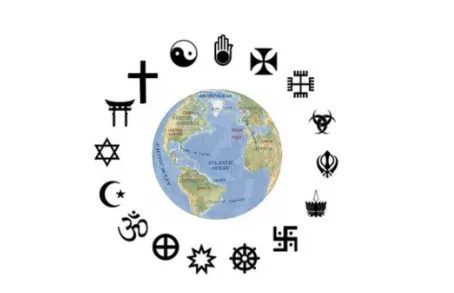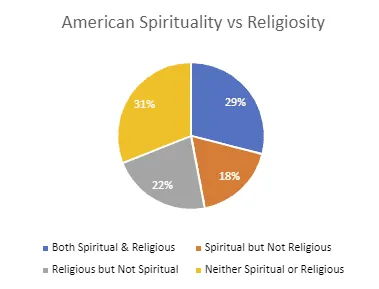Are Religion and Spirituality the same?
- Light Bringer

- Oct 11, 2024
- 5 min read
Depending on what your current belief system is (religious, spiritual, or both) the answer could vary based on how you perceive it. However, as a spiritual coach, in my opinion there are very distinct differences and similarities between the two that we will be delving into in this blog. Our belief system is shaped based on what we have learned from our environment that includes our parents, Society, school, friends, etc. I was born and raised in a Muslim country and studied that religion since it was taught in schools. When I moved to the United States back in the early 1990s, I ended up in the south also known as the “Bible Belt”. I began to explore Christianity by going to church and a few years later through a romantic relationship and working at a Jewish Community Center, I was introduced to Judaism. Although I appreciated and enjoyed the essence of all these religions and their basic principles, I had a hard time conforming to the practices and the belief that each thought it was superior to the other ones. Eventually, I started my own spiritual path after going through several traumatic experiences and turning inwards to find answers and healing.
I believe that people find peace in different ways and there is no right or wrong answer, as long as the practice aligns with you and your soul’s journey, that is all that matters!
In a world that’s constantly seeking meaning and purpose, the terms spirituality and religion often come up in conversations. While some use these words interchangeably, they represent distinct concepts, with their own unique characteristics and practices for how we live our lives. Understanding the difference between spirituality and religion can help clarify what drives your beliefs, and how you connect with the greater whole.
Religion typically involves a relationship with a defined deity or set of deities, and worship is central to this relationship. It is often seen as a structured system of beliefs, practices, and rituals aimed at guiding individuals in their relationship with the divine or a higher power. Religions are typically organized into institutions or communities, where followers adhere to shared doctrines, traditions, and moral codes. The structure of religion can often aim for an orthodox lifestyle for those who wish to practice it, or be less strict as some of the followers form their own community and practices.
Most religions have a defined organizational framework, which includes leaders (priests, imams, rabbis, etc.), and scriptures (like the Bible, Quran, Torah), and a set of practices that followers are expected to adhere to. However, many religions seem to have become more and more relaxed and many different branches have been extended from the original core to better appeal to the wider audience and allow more flexibility for those who may not wish to follow a strict set of rules and practices.
Furthermore, religion is community-focused as followers join together in communal worship, prayer, and ceremonies. There’s a strong sense of belonging to a group that shares the same worldview. These institutions often define the moral and ethical guidelines by which their followers are expected to live by. Additionally, a big appeal of religions is that they provide a set of doctrines that offer stories and answers to the big questions of existence: Who are we? Why are we here? How did we get here? What happens after we die? Etc. Rituals such as prayer, fasting, and weekly attendance for community worship often define the religious experience.
Most religious individuals believe that the particular religion they are practicing is the correct and true path to salvation, and there is little room for accepting other practices. This tends to separate one group from others based on the religion that is practiced in the community or the country of origin. The idea that one religion is superior or more complete than the other has been the source of countless wars and atrocities across the globe and throughout mankind ‘s civilization. We still continue the bloodshed across the globe based on our ideology, religious differences, and the self-righteousness that consumes humanity.
Spirituality, on the other hand, is a broader, more individualized concept of connecting with something greater than oneself. It often involves a personal exploration of life’s meaning, inner peace, and a connection to the universe or higher consciousness, without the need for external structures. Unlike religion, spirituality is largely individualistic and is about personal growth, inner peace, and finding one’s unique path in life. There are no strict rules or frameworks. The individuals set their own course as they learn how to become more heart-centered and allow the healing power of love that is the most powerful healing energy into their hearts.
Spirituality emphasizes the inner-self and the search for meaning within one’s own mind, body, and soul. Practices like meditation, mindfulness, breathwork, sound healing, Reiki, Tai Chi, Qi Gong and yoga are often used to deepen this self-awareness. While religion may involve worship of a specific deity or deities, spirituality often focuses on connection to the universe, energy, chi or life force. It’s about recognizing a sense of interconnectedness with all living things and this sense of oneness allows the heart to align with the mind to produce a coherent frequency of love and harmony.

While some may see spirituality and religion as opposing forces, others find that they can be complementary. Many religious people consider themselves spiritual, and their religion enhances their spirituality by providing structure to their beliefs. Similarly, some spiritual people may find comfort in religious practices, without necessarily adhering to all the doctrines of that religion. In essence, spirituality and religion both seek to address life’s big questions and foster a sense of connection with something greater than oneself. The main difference lies in the approach: religion offers a structured, outward, and communal path, while spirituality emphasizes a personal, inner journey to connect to the source within.
In conclusion, the difference between spirituality and religion boils down to the path one chooses to take in the pursuit of truth, meaning, and purpose of life.
Religion offers established guidelines, while spirituality encourages individuals to carve out their own unique paths. Neither is inherently superior, and for many, the journey may include aspects of both, as they seek to understand their place in the universe. The important thing is that both can offer avenues for personal growth, connection, and a deeper understanding of life. Whether you are drawn to religion’s communal bonds and traditions or prefer the individual exploration of spirituality, both can offer a fulfilling and meaningful way to navigate the complexities of existence.
Remember, that your thoughts shape your beliefs, your reality, and your experiences. The free will and the power of choice allows you to embark on this journey of life and shape it however you see fit.
Much love and light!
Lightbringer







Comments